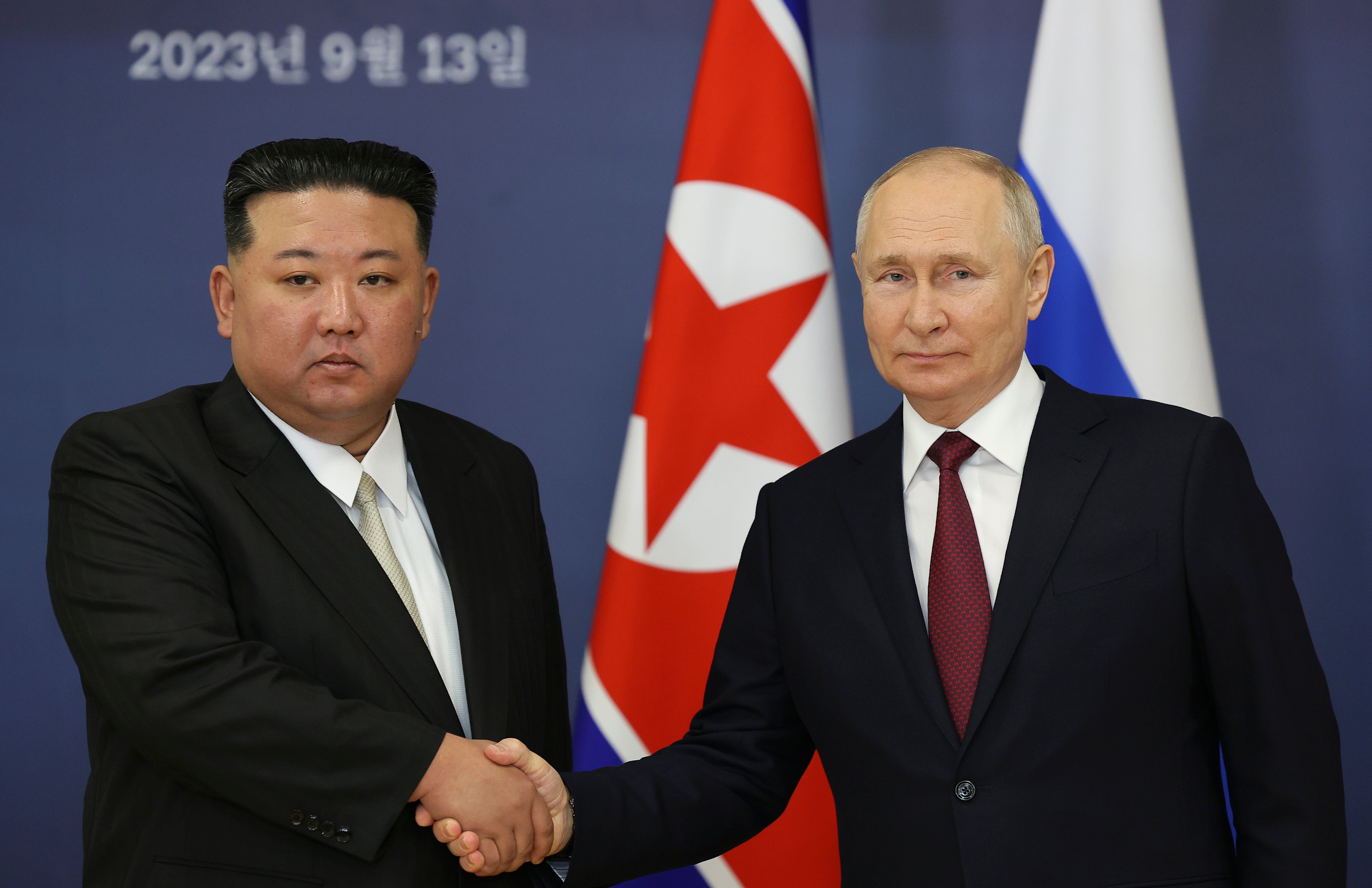Despite its semi-comic optics, Putin and Kim Jong-un’s show of comradeship is deeply sinister
Editorial: If the West is serious about defeating the modern-day axis of evil, it will have to match the determination of the autocrats in control of Russia, North Korea and Iran

Within living memory, an American president gave a memorable speech that featured a famous, if not infamous and ill-fated, soundbite – “the axis of evil”.
When George W Bush deployed the phrase in his State of the Union speech in 2002, he named Iran, Iraq and North Korea as the principal (and inter-connected) threats to America and to world peace, albeit as a cynical precursor to his illegal invasion of Iraq, which in fact turned out to the least potent of the three powers he pilloried.
Even so, today the West and the rules-based international order do face a very real axis of evil – comprising Iran, Russia and North Korea. The three pariah states are cuddling up for diplomatic warmth, and forming an increasingly close informal coalition. Iran and North Korea have been helping Russia break international sanctions for some time (the ayatollahs and Kim are past masters in the field), supplying weapons to the faltering Russian campaign in Ukraine, and helping to “launder” oil and financial flows. Bad as all that has been for peace and the civilian population of Ukraine, this new axis seems set to deepen its relationships.
The latest product of this unholy alliance is the summit in Russia between Vladimir Putin and Kim Jong-un. Despite the semi-comic brass bands, bad haircuts, obscene banqueting, Ruritanian uniforms and bombastic posturing, the Kim-Putin liaison is a deeply sinister one.
The secret arms deal between the two nations was probably concluded when the Russian defence minister, Sergei Shoigu, visited Pyongyang in July, with only the formalities left to settle between the two neo-Stalinists. The outlines are clear enough to be seen from space by one of the spy satellites the Russians are gifting to their new friends: food, including grain looted from Ukraine will be exported to North Korea in exchange for a flood of armaments such as artillery pieces and ammunition. Russia will also help Mr Kim further develop his nuclear intercontinental ballistic missile programme, and that poses a terrible dilemma for the entire Pacific region, and indeed the peace of the world. These are not men who place much of a premium on human life.
It has not been forgotten in Pyongyang that one reason why it was Iraq and not North Korea that was attacked by the United States and its allies was because Saddam Hussein hadn’t managed to develop his nuclear deterrent. President Kim knows that the survival of his regime and the Kim dynasty depends on possession of advanced thermonuclear power. That is why, in the end, President Trump’s audacious attempt to restrain Mr Kim’s nuclear ambitions failed.
The question is: what do America and the West do now? Japan, South Korea, Australia and America itself are menaced by an ever-more powerful Kim Jong-un, now increasingly backed by the Kremlin, which was traditionally wary of the wayward habits of the Kims.
To echo the arguments that raged before the Iraq war 20 years ago, can the United States simply watch as North Korea perfects weapons of mass destruction? These can, or soon can, be launched from land or long-range submarines, and reach California or New York. It is, indeed, a question that has gnawed away at successive presidencies, back to the time of Bill Clinton. None had come up with any answers, because both sanctions (Bush and Obama) and conciliation (Clinton and Trump) have failed.
Joe Biden seems set to continue that inglorious tradition. Diplomatically, the rapprochement between Russia and North Korea should concern China and India, if only because the looming shadow of a third world war is bad for business. That fact should give Beijing and Delhi further cause for doubt about their indulgent attitude towards President Putin’s miserable and unwinnable war on his neighbour. They, and the West, might also note that things must be fairly desperate on the ground for Mr Putin for him to be turning to Mr Kim’s well-armed but capricious and impoverished hermit kingdom for support. The dynamic between global superpower and regional player is the wrong way round.
In any case, there are actions that can, and have to be, taken straight away. The most immediate imperative is to help Ukraine defend itself against the North Korean munitions that are about to be rained down on the innocent in city apartment blocks, towns and villages. Thus far, Western missile systems have proved effective, but the demand from Kyiv for air power and ammunition is constant and impossible to decline.
If the West is serious about defeating the modern-day axis of evil, then it will have to match the determination of autocrats presently in control of Russia, Iran and North Korea. They cannot be allowed to prevail.



Join our commenting forum
Join thought-provoking conversations, follow other Independent readers and see their replies
Comments